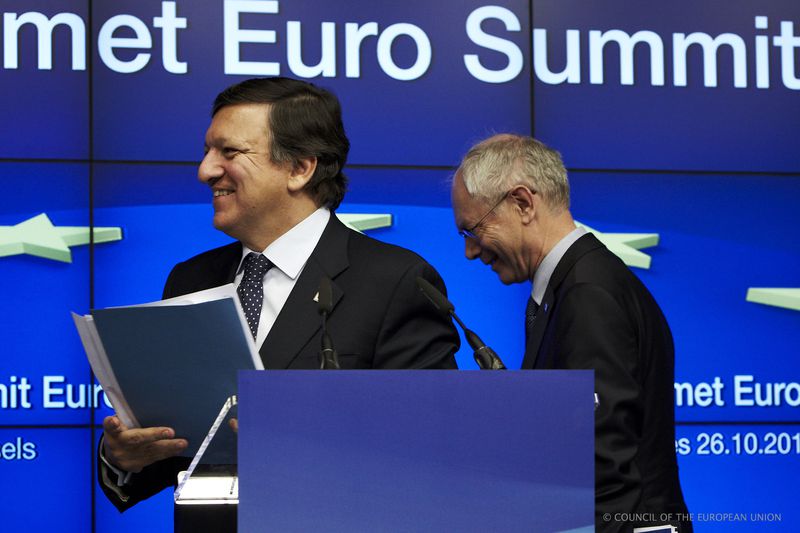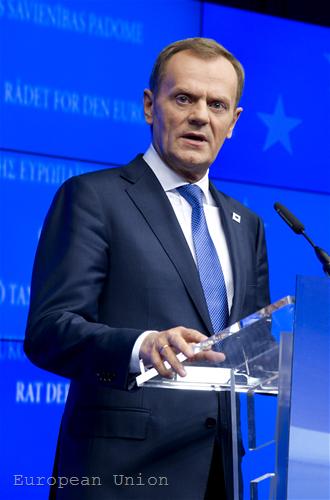Where Does the Potential for Growth of the European Economy Hide
Adelina Marini, October 11, 2011
 After three years of a heavy fight with the global financial and economic crisis, that has transformed into a fight for economic recovery, it is already clear that it cannot be led only on the front of stabilisation of public finances. Measures to boost growth are also needed. This issue was indicated as significant for this autumn by European Commission President Jose Manuel Barroso and Polish PM Donald Tusk, whose country is now holding the rotation presidency of the Union. A month after their meeting in Brussels, the Polish Presidency has come up with an ambitious report in which it shows where possibilities for economic growth are hiding and is making recommendations.
After three years of a heavy fight with the global financial and economic crisis, that has transformed into a fight for economic recovery, it is already clear that it cannot be led only on the front of stabilisation of public finances. Measures to boost growth are also needed. This issue was indicated as significant for this autumn by European Commission President Jose Manuel Barroso and Polish PM Donald Tusk, whose country is now holding the rotation presidency of the Union. A month after their meeting in Brussels, the Polish Presidency has come up with an ambitious report in which it shows where possibilities for economic growth are hiding and is making recommendations.
According to the Polish EU Presidency, the crisis will never be overcome unless the European economy would recover its dynamics. "We will not pay our debts, we will not wipe out our deficits, we will not succeed in creating jobs, especially for the young people, if we continue to tolerate the situation of stagnation. The temporary solutions of the crisis are not sufficient. We have to start thinking strategically, by also not forgetting the remaining challenges the European Union is facing, as the demographic situation for instance", is written in the announcement of the report.
Which are the main sources of potential growth?
A large part of the proposed possibilities are not new in their essence, but instead are being dragged around for years on a community level. According to the Polish Presidency, the first such source is European integration. By the way, this perspective is set literally as a slogan of the Polish Presidency, which deems a deepening integration as being a solution to Europe's problems. The next elements are the people, the single market, the small and medium enterprises, the green economy and energy efficiency, regions and EU's trade relations with the world.
The conversation for more integration is going on actively in the EU, although citizens are not too keen in participating in it while it is necessary for them to bailout eurozone countries. In the same time, according to this year's Eurobarometer study, most Europeans think that the current economic situation can be solved with coordination of the economic policies of the member states. 79% of the respondents share this vision. 91 per cent want the member states to cooperate more closely in their efforts to overcome the crisis. The Presidency's report points out specific facts in support of the thesis that enhanced integration leads to more prosperity. Economic convergence registers unprecedented successes - out of 27 countries in the world, that have grown from middle income to high income, 11 are in Europe. Besides, Europe benefits from the fact that capital flows move faster and easier from rich to the poor regions.
Serious attention in the report is paid to human capital as one of the main sources of growth in the contemporary economy. The problem, however, is that the perspectives are not good at all because, according to forecasts, in the next 40 years Europe's population will shrink by 20% while the populations of the United States and Latin America will grow rapidly. Precisely because of this the Polish Presidency recommends serious investments in human capital. As set in the Europe 2020 strategy, here too is proposed employment rate to reach 75%, as currently it is relatively low and reveals opportunities for growth. The recommendations in this direction are related to increasing the possibilities for jobs for young people, adults over 50 years of age and women.
For the purpose it is recommended increasing the funding for programmes aimed directly at citizens and in support of students, young researchers and mobility of workers, geographically but sectoral mobility too. It is proposed to increase student exchanges. Currently the difference between male and female employment in the EU is 13% and it is estimated that filling this gap would increase the gross domestic product of the eurozone by 13%. Nominal GDP would be boosted (assuming everything else equal) by 21% in Italy, 19% in Spain, 9% in France and Germany, 8% in the UK, 5% in Denmark and 3% in Sweden.
In order women to be able to join more actively the labour market, though, it is recommended to facilitate the access to child care services, as well as to promotion of a more balanced sharing of maternity between mothers and fathers.
Also part of using human capital as a potential for growth is the recommendation for reform of the education system so that it could offer people more adequate training courses, complied with the demands of the labour market. In the report it is estimated that this could boost GDP by 10% in the long term. Currently one of the obstacles to economic growth is shortage of qualified workers in the area of science, technologies, engineering and maths. The European Commission forecasts that the ICT sector (information and communication technologies) will suffer a shortage of qualified workers in the next five years. The forecast is about a shortage of 700,000 people only in this sector.
The document also calls EU's education system and the member states to take into account the fact that education is not an individual but a social process. It is recommended to increase the number of graduates in math, engineering, science and technologies by providing flexible and innovative forms of employment, like e-work, development of the European policy for Life Long Learning and redistribution of education funds in the form of coupons for citizens. In Europe there are nearly 4,000 higher education institutions and around 19 million students. However, according to the indicator of a number of graduates Europe is lagging behind the US because 34 per cent of the population graduate with higher education, while this percentage is 42 in the US and over 54% in Japan.
According to the document, if the share of educated people is increased for the group of 25-34 year-olds up to 40% this would lead to a potential increase of the European GDP by 4% per capita. This, in turn, would boost employment because the quoted data show that employment among the people with high skills is 83.9%, while those with medium skills is 70.6 and employment of low-skilled workers is only 48 per cent.
Great attention is paid to the ICT sector as it is responsible for 5% of EU's GDP. In 2010 e-commerce had a 12% share in EU's incomes, whilst in some countries these incomes amounted to over 25%. In the same time, however, there are large obstacles before transnational trade. Around 60% of cross-border online transactions fall through, because of too many restrictions imposed on the digital market, such as the coexistence of 27 different legal systems. Statistics also shows that legal uncertainty discourages 44% of consumers from buying in another member state and 80% percent of the companies involved or interested in cross-border trade export to a smaller than potentially possible number of countries because of legal barriers.
The authors of the report estimate that the creation of an effective digital market would generate additionally 4% of GDP by 2020. This is why one of the main recommendation is the single digital market to be established by 2015. Aside from the digital market, it is also recommended the creation of a European contract law as an alternative legal regime for e-contracts.
There is one more well known and still not progressing field that hides great potential for growth - the services sector. This is the sector that has the largest share in the Union's gross domestic product - 70% and is responsible for 68% of employment. The services create the most new jobs - 96%. But, as we remember from the times of the threat of the Polish plumber, the services market remains fragmented - only 20% of the services are being offered transnationally. The Services Directive, adopted in 2006, had to be endorsed by all member states by the end of 2009 but still there are countries that have not implemented it.
The economic benefits from its implementation are estimated to be between 60bn and 140bn euro, which is a potential for growth of 0.6% to 1.5% of GDP. A full liberalisation of the services sector and the creation of a digital single market would bring additional benefits worth some 800bn euros, the report claims, quoting forecasts of the British government. In order to achieve these benefits, the report recommends a continuation of the liberalisation of the services sector, active implementation of the competition legislation, focusing on national anti-monopolistic measures, nontransparent rules for public procurement, reducing roaming charges in the EU and putting a ceiling on data transfer.
Of course the report mentions infrastructure as a potential source of growth. But it is not talking simply about motorways but about completing the trans-European transport and energy infrastructure, providing access to broadband Internet by 2013 in all member states, investment in e-infrastructure for research, education or innovation. Another important recommendation is the creation of a single patent  system. Still there is no agreement between the member states on the single patent.
system. Still there is no agreement between the member states on the single patent.
As usually in such documents, attention is paid to small and medium sized enterprises as they represent 98% of EU's business. One of the recommendations to boost growth in the SME's is to enhance the programmes for loans guarantees. Regional policy is also broadly discussed in the report, as it mentions that it does not have just economic benefits because it also contributes to the building of modern models of multiannual and multilayer governance. This, in its turn, stimulates the administrative mechanisms in the member states. A huge challenge for EU's regional policy at the moment is to prevent its marginalisation as a result of the need of budget consolidation. This, according to the report, should remain the main EU policy, aimed at boosting European growth.
The document outlines, as one of the main challenges for the European economy, the growing competition of the emerging economies, like China, India and Brazil. According to data of the Organisation for Economic Cooperation and Development (OECD) by 2030 the emerging and developing economies will generate 60% of global GDP. China's trade and investment expansion in Africa, Latin America and Central Asia, as well as the growing number of regional trade agreements, could lead to marginalising EU's role, the analysis points out. This is why the Polish EU Presidency recommends enhancing the already traditionally strong economic ties with the south and east neighbours. This would serve to counterbalance the Asian domination in global trade, the authors think.
As can be expected precisely from Poland, which is the initiator of the Eastern Partnership and hosted the second summit with the six countries from the region in the end of September, it is proposed deep and comprehensive free trade agreements to be concluded with Ukraine, Georgia and Moldova because this would lead to opening of new markets for exports to the east. Currently negotiations on such an agreement is holding only Ukraine but they, although being in their final stage, are directly related to the political situation in the country. At the Warsaw summit it became clear that there were expectations negotiations on such agreements to start in the end of the year with Georgia and Moldova. Those are the three countries considered excellent performers in the Eastern Partnership.
The Presidency also recommends conclusion of trade negotiations with India, Canada and Singapore. The only agreement that has been signed last year and entered into force on July 1st this year was with South Korea. Among the recommendations is a more active trade policy with the countries with which the EU does not have bilateral agreements such as China, the US and Russia. Another interesting proposal is attracting ambitious people from third countries.
The Polish Presidency does not have the ambition to be comprehensive with this document but hopes that it would serve as a basis for broad discussions in the EU. The Presidency has put the uneasy task to include this document on the agenda of the European Council on October 23rd in Brussels, hoping that the leaders will put some achievable measures to boost growth. The problem, however, is that this Council is overloaded with another rescue operation of the euro area. euinside will be in Brussels for the Council and will follow whether against the backdrop of the crisis the leaders will spend some time on the future - the short-term future and also the long-term future.
 | © The Council of the European Union
| © The Council of the European Union | © The Council of the European Union
| © The Council of the European Union | © European Union
| © European Union